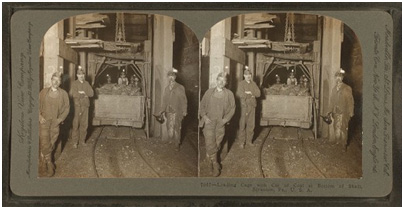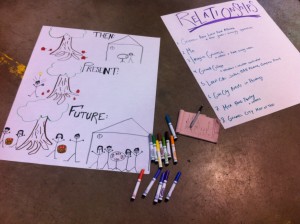Greetings to you from North Eastern Pennsylvania! This is Energy Corps member Whitney Fenton, writing from the Kingston, PA office of the Commission on Economic Opportunity, where I began my eleven month term in November of last year. As you’ve stumbled upon this blog, there is a good chance that you are interested in conservation issues. I hope that’s the case because I think they’re important too! The environmental problems we face today can be overwhelming, so to start, I just want to share this encouraging little video from dirt!:
Keep on keeping on, hummingbird.
In terms of potential influence, the Department Of Energy (DOE) is more like the elephant than the hummingbird in that story. I’ve been privileged to spend the majority of my service, so far, working on a DOE project called the Weatherization Innovation Pilot Program (WIPP). The project is an aspect of the Department of Energy’s Weatherization & Intergovernmental Program (WIP). Where WIP is a set of programs designed to increase energy efficiency in the United States, WIPP is one of those programs focused on keeping the measures and practices of the weatherization assistance offered under WIP up to date with current technological advancement and as cost effective as possible.
In practice, the WIPP work carried out at my host site is aimed at meeting a perceived need of electricity consumers for access to timely information about their energy usage so as to increase power use efficiency at the consumer level. By providing clients with “home energy displays”, WIPP improves client energy consumption information availability from a current once monthly report to a constant steady stream of real time usage data. In addition, the program requires Energy Corps members to take time to discuss conservative and in-home energy use habits with clients. Following installations, our WIPP program tracks the energy saving success of the two measures. Tiffany Welch, a former Energy Corps member wrote a blog post regarding WIPP in February of this year that is worth checking out to learn more about the program. Additionally, a recent news article in the region’s Citizen’s Voice highlights a day in the life of an Energy Corps member here in Kingston.
One cool aspect of our WIPP project is that, while not directed by the policy, the WIPP work also happens to be pertinent to Congress’ Statement of Policy on Modernization of the Electricity Grid, Title XIII- section 1307. The clause states “Purchasers shall be provided with the number of electricity units, expressed in kwh, purchased by them… on no less than a daily basis”. Section 1302, meanwhile, requires extensive and timely reporting on measures enacted in response to the policy. The WIP program is aimed at helping clients afford their energy bills; the Smart Grid movement is focused on making sure that there is sufficient power available to all clients. Both are related as they have an emphasis on energy conservation. My work allows me to address both policies.
In regards to the progress of our WIPP initiative, I’m happy to report, we’re nearing the number of device installations set as a goal at the outset of the program. Following the final installations, we’ll continue to analyze the device’s success at helping clients save energy before a decision is made about whether and how to implement the device and education measures on a broad scale. Also, our host site is surveying current and former Energy Corps educators to develop a set of best practices for introducing our in-home energy conservation content to clients.
I spend about half my time on the road commuting from home to home. I’ve enjoyed working out the details of the mental map of the region that develops as my familiarity increases. I’m learning the path of the East fork of the Susquehanna, and the headwaters of the Schuylkill, and the ridge lines of the folds of mountains. I’ve enjoyed the process of learning of the region’s businesses, administrations, anecdotes, histories, problems, crimes, people, and organizations. There is a shared history of the region that saw small farming communities boom in the mid-19th century as coal production increased and then slowly lose economic standing as other, less expensive energy options became popular during The Great Depression and the decades that followed. The growth of our nation was sponsored in part by this region
A non-WIPP related aspect of my Energy Corps term that has impacted my view on energy conservation is the region in which I’m serving. North Eastern Pennsylvania grew rapidly in the mid-19th century due to the anthracite mining industry. Following the Great Depression, however, many coal consumers switched to cheaper fuel sources and the industry shrank just as rapidly as it had grown to the low that it is now. In the midst of a landscape permanently impacted by the mining that took place in the last century, the region is still redefining itself economically following the decline of its former largest source of income. Fuel extraction is, by nature, an industry that booms locally then dries up leaving the cities and towns that grew up alongside it in difficult economic straits. Additionally, fuel extraction, by nature, tends to expose the earth’s surface to pollution and contaminants that are harmful ounce churned out of their resting place. Many of the natives of this region are now tied to its geographic history because their very families were instrumental in mining it into its current shape. Meanwhile, many of those family members had health impacted by their roles in the mines. The anthracite extracted during the height of the region’s coal mining industry has long since been burned for heat or as fuel for the industrial revolution.
Miners in a shaft in North Scranton, PA. Robert N. Dennis collection of stereoscopic views
This heritage is not only history for the region of North East Pennsylvania, but a recurring reality as the region now finds itself home to a new fuel extraction industry, fracking. Living where the potential impacts of the controversial industry are deeply felt has allowed me to value opportunities to encourage energy conservation even more. In the midst of controversy, I have no answers to our need for fuel, but I do have tips to make conservative choices when using energy in your home.
There are many facts and statistics that reinforce, for me the importance of my service. Over the next seven years, electricity prices are forecast to increase 50%. During the winter of 2007/08, 20% of Americans fell behind in their energy payments and an astonishing 8.7 million American consumers were disconnected from utility services.
I can’t put out the fire but, household by household, I, have a chance to be like the hummingbird, to fight the fire as best I can. There are daily reminders in the region I’m serving about why it is important to do so.
 Whitney Fenton graduated in May of 2012 from Gordon College in Wenham, MA with a B.S. in Biology and minors of study in outdoor education and chemistry. She’s held a variety of positions including backpacking trip leader, food service worker, and college Sustainability Tracking, Assessment, and Rating Systems intern. She also participated in landscape ecology research during her undergrad years. This year, she’s looking forward to learning a great deal about energy efficient technology and a chance to invest my education and experience in a mission I love.
Whitney Fenton graduated in May of 2012 from Gordon College in Wenham, MA with a B.S. in Biology and minors of study in outdoor education and chemistry. She’s held a variety of positions including backpacking trip leader, food service worker, and college Sustainability Tracking, Assessment, and Rating Systems intern. She also participated in landscape ecology research during her undergrad years. This year, she’s looking forward to learning a great deal about energy efficient technology and a chance to invest my education and experience in a mission I love.
In her role as an Energy Corps member she will be providing home assessments and education to PA residents seeking to decrease their energy consumption and lower their monthly utility bills. Additionally, she plans to research and develop the Energy Corps’ set of best practices for effectively helping communities reduce their energy consumption.









